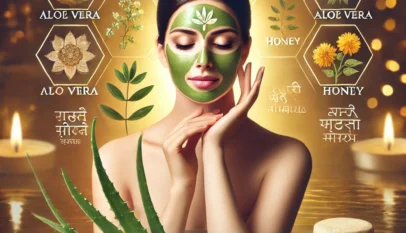
Skin care has become a priority for many, as people seek ways to enhance their appearance and maintain healthy skin. Incorporating natural ingredients can significantly improve skin health, providing nourishment and hydration. With a wealth of information available, understanding the practices emphasized in Hindi can make a difference in how one approaches skincare.
Products rich in organic components are gaining traction for their effectiveness. They cater to diverse skin types, addressing specific concerns such as dryness, acne, and aging. By exploring various techniques and remedies discussed in Hindi, individuals can tailor their routines to achieve optimal results.
Embracing cultural insights can empower people to adopt skin care practices that resonate with their lifestyles. This knowledge encourages a more personal connection to routines, enhancing the overall experience. Discovering simple, effective methods can lead to a more fulfilling and successful approach to skin care.
Daily Skin Care Routine
A daily skin care routine is essential for maintaining healthy skin. Key components include cleansing, moisturizing, and sun protection. Each step plays a vital role in addressing specific skin needs and improving overall skin health.
Cleansing
Cleansing is the first and fundamental step in any skin care regimen. It helps remove dirt, oil, and makeup, which can clog pores and lead to breakouts. A good cleanser should match skin type—gel-based cleansers work well for oily skin, while cream cleansers suit dry skin.
To cleanse effectively, she should use lukewarm water and massage the cleanser gently onto the face for about 30 seconds. Rinsing with cool water helps close the pores. It’s advisable to cleanse twice daily, in the morning and at night, to keep the skin free of impurities.
Moisturizing
Moisturizing is crucial for keeping the skin hydrated and maintaining its barrier function. Using an appropriate moisturizer helps lock in moisture and prevents dryness, which can lead to dullness and fine lines. This step is important regardless of skin type—oily skin needs lightweight formulas, while dry skin benefits from richer creams.
Applying moisturizer immediately after cleansing allows better absorption. She should look for key ingredients such as hyaluronic acid or glycerin for hydration. Additionally, incorporating a serum can enhance the moisturizing effect by delivering concentrated nutrients.
Sun Protection
Sun protection is a non-negotiable part of a daily skin care routine. UV rays can cause premature aging, dark spots, and increase the risk of skin cancer. Using a broad-spectrum sunscreen with at least SPF 30 is essential for all skin types.
It is advised to apply sunscreen daily, even on cloudy days. She should reapply every two hours, especially if engaged in outdoor activities. Some moisturizers include SPF, but he should ensure adequate protection by using a separate sunscreen if needed.
Natural Remedies and Ingredients
Natural remedies can significantly enhance skin health, offering benefits without harsh chemicals. Key ingredients like aloe vera, neem, and turmeric are well-known for their effectiveness in skincare routines.
Aloe Vera
Aloe vera is celebrated for its soothing and hydrating properties. It contains vitamins A, C, and E, which are essential for healthy skin.
- Moisturizing: Aloe vera gel acts as a natural moisturizer, preventing dryness.
- Healing Properties: It is effective in treating sunburns and minor cuts, promoting quick healing.
- Anti-Aging: Rich in antioxidants, aloe vera helps in reducing the appearance of fine lines and wrinkles.
To use aloe vera, one can directly apply the gel from the leaf onto clean skin or add it to homemade masks.
Neem
Neem, often referred to as “nature’s pharmacy,” offers numerous benefits for the skin. It contains antimicrobial properties that help in treating various skin issues.
- Acne Treatment: Neem helps reduce acne due to its antibacterial qualities. It unclogs pores and reduces inflammation.
- Skin Rejuvenation: Neem oil can also enhance skin tone and texture, promoting an even complexion.
- Anti-Fungal: Its antifungal properties make it effective in combating skin infections.
To incorporate neem, one might use neem oil or prepare a paste from neem leaves and apply it as a face mask.
Turmeric
Turmeric has been used for centuries in traditional medicine, particularly in skincare. Its active ingredient, curcumin, is responsible for many of its skin benefits.
- Brightening Effect: Turmeric can help brighten the skin and even out skin tone.
- Anti-Inflammatory: It is a powerful anti-inflammatory agent, reducing redness and irritation.
- Acne Prevention: By controlling oil production, turmeric can help prevent acne outbreaks.
Turmeric can be mixed with yogurt or honey to create a face mask for added benefits.
Recycling Drop Off: Essential Tips for Responsible Waste Disposal
Many communities offer recycling dropoff locations, providing an essential service for tho…










